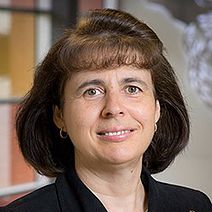 Lucie Germain, Ph.D.
Lucie Germain, Ph.D.
Director,
Centre de recherche en organogénèse expérimentale de l’Université Laval/LOEX
CHU de Québec Research Center-Université Laval
Full Professor,
Department of Surgery within the Faculty of Medicine of Université Laval
Research Chair of Canada in stem cells and tissue engineering, senior level
To give for research (philanthropy): Research chair on reconstructed organs and their clinical applications
Full list of Publications (external link)
Biosketch
Dr. Lucie Germain, the former Vice-Dean of Research and Graduate Studies at the Faculty of Medicine of Université Laval, is Full Professor at the Department of Surgery. She is also Director of the “Centre de recherche en organogénèse expérimentale de l’Université Laval/LOEX” since 2020. She is researcher at the CHU de Québec - Université Laval Research Center in the Regenerative Medicine Division. From 2009 to 2015, she was director of the “Cell and Tissue Therapy network of the Fonds de Recherche du Québec en Santé (FRQS) (Réseau ThéCell)”. Prof. Germain holds a Tier 1 (Senior) Canada Research Chair in stem cells and tissue engineering (2015-2021) in continuity with her Tier 2 Canada Research Chair (Junior) in stem cells and tissue engineering (2001-2010). She is one of the recognized medical scientists in Canada, as evidenced by her appointment as a member of the Canadian Health Sciences Academy. Many important positions have been entrusted to her over time. She acted as a delegate on behalf of the University at the Canadian Institutes of Health Research (CIHR) from 2005 to 2014, she was a member of the Scientific Advisory Board of the Institute of Musculoskeletal Health and Arthritis (IMHA) from 2006 to 2012, she was a member of the Board of Directors of the FRQS (1999-2006) and was Director of the Regenerative Medicine division at CHU de Québec Research Center-Université Laval (2012-2015). She has received continued financing for her research by the major agencies during her career and her success has been rewarded with several awards, including the award for “research and quality of life” from IMHA and the CIHR “Synapse mentorship award”.
Since 1989, Prof. Germain leads an active scientific career that stretches from basic research to clinical research. She has developed a distinctive competence in tissue engineering. She focuses on the characterization of human postnatal stem cells as well as on the reconstruction of organs (e.g. skin, cornea) in order to produce autologous substitutes for the replacement of damaged organs. She has published nearly 140 original articles, 64 book chapters and review articles with her team, her co-investigators and collaborators. Her research resulted in two clinical trials that are the first of their kind in Canada. The first, which began in 2012 in collaboration with Dr. Richard Bazin, focuses on the use of laboratory-grown autologous epithelial cornea to treat stem cell deficits in the limbus of the cornea. The second was initiated with Dr. Auger in 2014 and focuses on the use of reconstructed bi-layered autologous skin for severely burnt patients.
Prof. Germain’s projects include the reconstruction of various organs/tissue by tissue engineering (skin, cornea, blood vessel, valves). With specific interest in the identification of differentiation pathways involving epithelial cells of the human skin as well as in the characterization of the skin and corneal stem cells. Her students have focused on the improvement of skin reconstructed through the self-assembly approach. They also worked on the addition of hair follicles, endothelial cells, the conservation of stem cells for the persistence of the grafts, the preservation of melanocytes to increase pigmentation, the production of elastic fibers to improve the mechanical properties and then, the reduction of cost and time required to produce these grafts. The ultimate goal of this work is to produce reconstructed tissues of the highest quality using the tissue engineering methods that have been designed, developed and improved at the LOEX over the last 30 years. Future avenues include the use of cells that have been corrected by genetic engineering in the reconstruction of tissues and organs in order to develop treatment for rare diseases such as epidermolysis bullosa.
Over the years, Prof. Germain has recruited and mentored a large number of young researchers who, each on their own, advance science towards new applications in regenerative medicine (e.g. Julie Fradette, Roxane Pouliot, Stéphanie Proulx, etc.). Her leadership, dynamism, rigor and unshakable optimism makes Prof. Germain an ally prized by her fellow researchers, clinicians and academic leaders. In addition, she is a respected figure and a source of inspiration for all students and professionals that pass through the LOEX.
